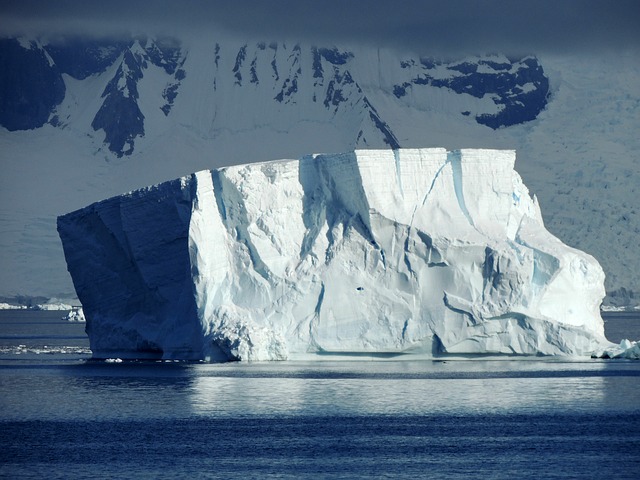US/UK led research to predict risk of catastrophic sea level rise – key Antarctic glacier at risk of collapse as ice loss spreads
- May 1, 2018
- Posted by: administrator
- Category: Environmental, Global, Arctic & Antarctica

A new UK-U.S. Antarctic research programme to improve the prediction of future sea level rise was launched yesterday at British Antarctic Survey (BAS), Cambridge to discover whether the collapse of a huge Antarctic glacier could raise global sea levels by as much as a metre by the end of this century.
According to Doug Benn, Professor of Environmental Change at the University of St Andrews who will lead one of the eight projects which make up the the programme, indications are that “the process of collapse has already begun.”
The $25 million (approx. £20 million ) 5-year research collaboration, funded jointly by the U.S. National Science Foundation (NSF) and UK Natural Environment Research Council (NERC), brings together over 100 polar scientists from leading UK and U.S. research organisations.
The funding is for eight large-scale research projects and a for a co-ordination grant – the research campaign begins in October 2018 and continues to 2023. The joint UK-US research programme will be one of the most detailed and extensive examinations of a massive Antarctic glacier ever undertaken.
NERC and the US National Science Foundation will deploy scientists through the projects to gather the data needed to understand whether the glacier’s collapse could begin in the next few decades or centuries.
The International Thwaites Glacier Collaboration (ITGC) is also the largest Antarctic research project undertaken by the two nations since the 1940s. Their goal is to investigate the implications of a major glacier collapse on future sea level rise. The major scientific research project that aims to understand what is happening to the glacier in West Antarctica, and predict how soon it will collapse in response to climate change.Their mission is to deploy teams of researchers, using a suite of technologies to investigate changes on the ice and in the ocean.
The International Thwaites Glacier Collaboration will involve around 100 scientists from world-leading research institutes in both the UK and US alongside researchers from South Korea, Germany, Sweden, New Zealand and Finland.
Indications are that process of collapse has already begun – Thwaites Glacier is Achilles heel of Antarctic ice-sheet
Researchers at the University of St Andrews have won two major grants of £438,000 and £540,000 as part of the project to discover whether the collapse of the huge Antarctic glacier could raise global sea levels by as much as a metre by the end of this century.
Doug Benn, Professor of Environmental Change at the University of St Andrews will lead the DOMINOS (Disintegration of Marine Ice Sheets Using Novel Optimised Simulations) project which will use computer modelling to examine how break-up of the glacier could increase the rate of ice flow into the ocean.
Professor Benn said:
“The Thwaites Glacier is the Achilles heel of the Antarctic ice-sheet. It is particularly sensitive and indications are that the process of collapse has already begun.
“The glacier has been thinning and speeding up due to increased melting beneath its floating tongue. Our concern is that breakup of the ice tongue could greatly accelerate the rate of ice loss in the near future, with a big impact on sea level. A rise of one metre in sea levels would mean a greater frequency of coastal flooding during extreme weather events, such as storm surges, hurricanes, and when big river flows coincide with high tides.”
The collapse of the Thwaites Glacier in West Antarctica could significantly affect global sea levels. It holds enough water to raise global sea level by 40cm, but its collapse would also destabilise other parts of the ice sheet, with a total potential sea level rise of more than three metres.
Scientists know already that Thwaites Glacier, which is twice the size of the UK, accounts for around 4% of global sea level rise. This contribution has doubled since the 1990s. The big unknowns are whether the glacier is likely to collapse in response to environmental change; when this might happen; how big a collapse could be, and the potential impact on sea level rise.
Director of BAS, Professor Dame Jane Francis commented:
“Both the UK and U.S. have considerable expertise in the fields of glaciology and oceanography. We have spent decades working individually and collaboratively to understand Antarctica’s changing environment and the impact this will have on our planet. Recent advances in satellite technologies, combined with state-of-the art technologies such as hot-water drilling through ice shelves and robotic underwater vehicles equipped with sensors, put our countries in a strong position to combine our scientific, technical and operational expertise for the benefit of society. It’s a tremendously exciting time for science.”
The logistics of mounting a scientific campaign in one of the most remote places in Antarctica is a huge operational challenge. The nearest permanently occupied research station to the Thwaites Glacier is more than 1600km away. Both countries will co-ordinate their aircraft operations to transport glaciologists to their study sites on the ice, and deploy their ice-strengthened ships so that oceanographers and geophysicists can approach the glacier from the sea.
Professor David Vaughan is Director of Science at British Antarctic Survey and the lead scientific coordinator for the UK added:
“Whilst Antarctica seems far away, what is happening there is already affecting sea-levels around the world. UK and U.S. scientists have a track record of working well together on the ice, and together we have a unique opportunity to change our understanding of Antarctica. We believe this programme will generate the information we need to help protect coastal cities, ecosystems and vulnerable communities around the world.”
